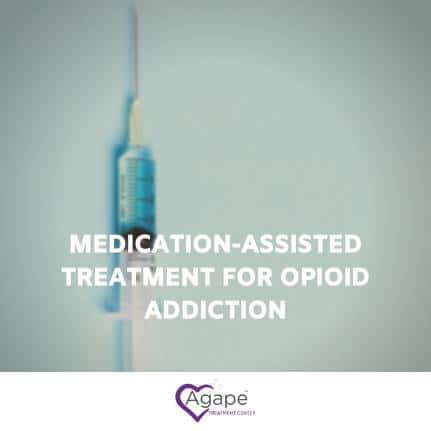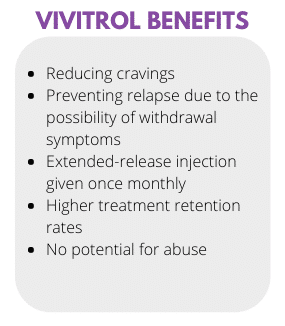
MAT is the use of FDA-approved medications within a comprehensive addiction treatment program. The most successful use of MAT is when it is used in tandem with behavioral therapy. The most common medications used to treat opioid use disorders are methadone, buprenorphine, naloxone, and naltrexone. While these medications are sometimes met with controversy, there is much evidence supporting the safe use of MAT drugs.
Table of Contents
ToggleBenefits of Medication-Assisted Treatment
Medication-assisted treatment can help sustain recovery for those suffering from opioid use disorder. These medications help normalize brain chemistry, block the pleasurable effects produced by opioids, alleviate cravings, and mitigate withdrawal symptoms. As a result, it allows individuals to focus fully on their program of recovery and therapy. Sometimes, MAT for opioid use disorder is referred to as Opioid treatment programs (OTPs). In addition to aiding in the treatment process, OTPs aim to prevent illicit drug use, reduce criminal activity, and help stop the spread of drug-related diseases. Additionally, it focuses on improving the quality of life of individuals seeking treatment.[1]
SAMHSA also reports that MAT has been proven to:
- Reduce opioid overdoses
- Increase treatment retention rates
- Decrease illicit opioid use and criminal activity among people with substance use disorders
- Improve patients’ abilities to gain and maintain jobs
- Improve the birth outcomes of women with opioid use disorders who are pregnant
While MAT is not for everyone, there are many individuals who can benefit from it. The three most popular MAT programs involve the use of Methadone, Suboxone, or Vivitrol
Methadone
Methadone is a synthetic opioid agonist. As an opioid itself, methadone acts on opioid receptors in the brain. By activating these receptors, it makes a person stop wanting other opioids. However, when taken as prescribed, methadone does not produce any euphoric effects. As a result, it helps eliminate withdrawal symptoms and relieves opioid cravings.[2]
Methadone is usually prescribed as a pill or dissolvable tablet. Unfortunately, it has the potential for abuse, causing some controversy to surround the use of the drug.
Suboxone
Suboxone contains buprenorphine and naloxone. It is sold as an oral film that dissolves when placed under the tongue. Suboxone comes in four different doses (2mg, 4mg, 8mg, and 12mg) making it easy to wean a person off of. Both buprenorphine and naloxone have different responsibilities in the use of Suboxone for opioid use disorders.
Buprenorphine is a partial opioid agonist that binds to opioid receptors in the brain. By doing so, it reduces withdrawal symptoms and opioid cravings. Since it is a partial opioid agonist instead of a full opioid agonist, it is less likely to cause euphoric effects like Methadone.
Naloxone, on the other hand, is used to prevent medication or opioid abuse. As an opioid antagonist, it blocks the effects of opioid substances if they are taken. For example, if you inject heroin while taking Suboxone, the naloxone will reject the drug and cause immediate withdrawal symptoms. This quality of Suboxone helps deter those who are taking it from abusing opioids.[3]
Vivitrol
Vivitrol is a monthly injection containing extended-release naltrexone. It is also sold as a pill, but the shot is more popular, efficient, and effective. Patients should not begin taking Vivitrol until they have abstained from opioids for a minimum of 7-10 days.
Like naloxone, naltrexone blocks the euphoric effects of opioids like morphine, oxycodone, and heroin. Unlike buprenorphine or methadone, Vivitrol does not activate opioid receptors. Instead, it simply binds to the receptors and blocks them off from other substances. As a result, cravings for opioid medications are suppressed.
If a person consumes an opioid while taking Vivitrol, they will not feel the sedative or euphoric effects of the opioid. This can help divert people from relapsing. Vivitrol is becoming increasingly popular in MAT programs in Fort Lauderdale due to the fact that there is no potential for abuse.[4]
Medication-Assisted Treatment in Fort Lauderdale
When MAT is used simultaneously with behavioral therapy and addiction counseling, it can provide patients with the tools needed to maintain sobriety. It takes the focus off of cravings and withdrawal symptoms and places the focus on necessary treatment.
Research shows that a combination of medication and therapy can successfully treat these disorders, and for some people struggling with addiction, MAT can help sustain recovery. Learn about many of the substance use disorders that MAT is designed to address.
If you or a loved one is ready to start your recovery, contact Agape Treatment Center in Fort Lauderdale. We use a “whole-patient” approach when treating opioid use disorders. With the use of therapy and MAT, we can help you sustain your recovery from opioids. If you are ready for addiction treatment that works, learn more about our MAT program in Fort Lauderdale.
References:
- https://www.samhsa.gov/medication-assisted-treatment/treatment
- https://www.drugabuse.gov/publications/research-reports/medications-to-treat-opioid-addiction/how-do-medications-to-treat-opioid-addiction-work
- https://www.medicalnewstoday.com/articles/325827.php
- https://www.samhsa.gov/medication-assisted-treatment/treatment/naltrexone









